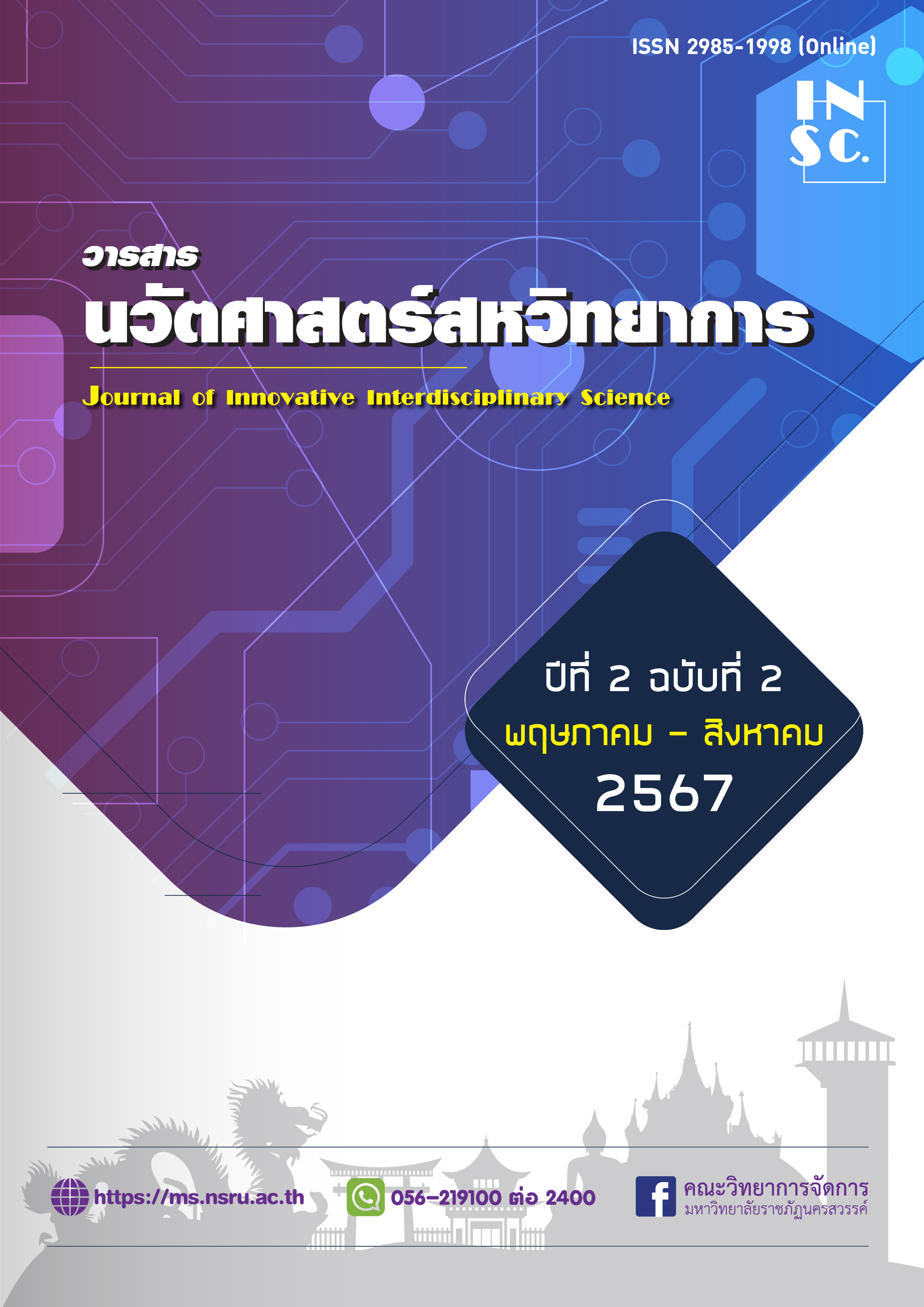Green Business: Driving Towards Sustainability Under the Challenges of the Digital Era
Main Article Content
Abstract
Green Business, which focuses on environmentally friendly operations, is playing a significant role in the digital economy, especially as consumer awareness of environmental issues rapidly increases. The adoption of new technologies and innovations, such as renewable energy and recycling, helps reduce natural resource use and greenhouse gas emissions. However, Green Businesses also face challenges, including the cost of investing in environmentally friendly technologies, raising consumer awareness, adapting to new technologies, complying with environmental regulations, and managing financial resources.
This article proposes strategies for driving Green Business towards sustainability in the digital era, using relevant theories such as Sustainable Development Theory and the Triple Bottom Line (TBL). These theories can help Green Businesses reduce their environmental impact and enhance their competitiveness. The review of related literature indicates that digital technology can significantly improve operational efficiency and reduce energy consumption. However, Green Businesses still need to focus on raising awareness, managing resources efficiently, and securing financial support to achieve sustainability and create a positive impact on society and the environment.
Article Details
References
กัลยา ทวีปศรี, และ พรทิพย์ ปานบรรจง. (2563). การศึกษาและการให้ความรู้เกี่ยวกับการบริโภคที่ยั่งยืนในโรงเรียนกรุงเทพฯ. วารสารวิจัยการศึกษา. 9(2): 45-60.
กิตติศักดิ์ พานิช, และ อุดมศักดิ์ ทองมาก. (2563). การปฏิบัติตามมาตรฐานสิ่งแวดล้อมในธุรกิจสีเขียวในภาคกลาง. วารสารการจัดการสิ่งแวดล้อม. 8(1): 33-50.
จันทนา ภานุพันธุ์, และ ประเสริฐ ศรีเมือง. (2563). การจัดการต้นทุนในธุรกิจเกษตรอินทรีย์ในภาคเหนือของประเทศไทย. วารสารเกษตรกรรมภาคเหนือ. 5(1): 77-95.
จิตร กิตติศักดิ์, และ ทองสุข ทองสุก. (2564). การปรับตัวให้สอดคล้องกับกฎหมายและข้อบังคับในธุรกิจสีเขียวในภาคตะวันออกเฉียงเหนือ. วารสารการจัดการธุรกิจสีเขียว. 9(2): 55-75.
ตลาดหลักทรัพย์แห่งประเทศไทย. (2564). กระบวนการขับเคลื่อนธุรกิจสู่ความยั่งยืน. สืบค้นเมื่อ 20 กรกฎาคม, 2567, จาก https://www.wealthythai.com/en/updates/sustainability/1975
ธรรมพร พิพัฒน์ไพบูลย์, และ สังศิตร์ ขุนทวี. (2565). การปฏิบัติตามมาตรฐานสิ่งแวดล้อมในธุรกิจสีเขียวในเชียงใหม่. วารสารการปฏิบัติตามกฎระเบียบสิ่งแวดล้อม. 10(3): 120-135.
ธรรมศักดิ์ พิพัฒน์ศรี, และ สมศักดิ์ นคร. (2564). การสนับสนุนทางการเงินในธุรกิจสีเขียวในภาคตะวันออกเฉียงเหนือของประเทศไทย. วารสารเศรษฐกิจสีเขียว. 9(1): 112-125.
บริษัท พีทีจี เอ็นเนอยี จำกัด (มหาชน). (2566). การบริหารจัดการด้านความยั่งยืนองค์กร. สืบค้นเมื่อ 20 กรกฎาคม, 2567, จาก https://www.ptgenergy.co.th/Sustainable
/SustainableDevelopmentStrategy
ปวีณา สุทธิวัง, และ สุนิสา เจริญสุข. (2566). การให้ความรู้และการตลาดสินค้าสีเขียวในกรุงเทพฯ. วารสารวิจัยผู้บริโภค. 12(1): 88-105.
ศักดิ์ชัย วงษ์เพชร, และ สมพงษ์ พิพัฒน์. (2563). การฝึกอบรมและพัฒนาทักษะทางเทคนิคในธุรกิจสีเขียวในภาคเหนือของประเทศไทย. วารสารเทคโนโลยีสีเขียว. 11(2): 101-115.
สมปอง วงศ์พานิช, และ กิติยศ สกุลชัย. (2564). การใช้ IoT ในการจัดการพลังงานในโรงงานผลิตในประเทศไทย. วารสารเทคโนโลยีอุตสาหกรรม. 11(2): 90-110.
สมบัติ สมบัติ, และ ฉัตรชัย คงประเสริฐ. (2565). การใช้ AI ในธุรกิจสีเขียวในกรุงเทพฯ. วารสารเทคโนโลยีสีเขียว. 9(3): 78-95.
วัฒนา ศรีสุข, และ สุพัฒน์ สมบูรณ์. (2564). การพัฒนาทักษะทางเทคนิคในธุรกิจสีเขียวในภาคตะวันออกเฉียงเหนือของประเทศไทย. วารสารเทคโนโลยีสีเขียว. 12(1): 98-110.
Anderson, S., & Roberts, T. (2020). The impact of green investment on sustainable business growth. Journal of Environmental Economics and Management. 100: 102-328.
Barney, J. B. (1991). Firm Resources and Sustained Competitive Advantage. Journal of Management, 17(1), 99-120.
Brown, K., & Taylor, J. (2021). Technical Training for Green Businesses in the United States and Europe. Journal of Green Technology. 16(3): 178-195.
Brown, P., & Zhang, L. (2021). IoT applications in energy management for sustainable businesses. Renewable and Sustainable Energy Reviews. 135: 110255.
Brundtland, G. H. (1987). Our Common Future: Report of the World Commission on Environment and Development. Oxford University Press.
Carter, R., & Blake, S. (2021). Navigating environmental regulations in the green economy. Business and Society Review. 126(2): 205-222.
Elkington, J. (1997). Cannibals with Forks: The Triple Bottom Line of 21st Century Business. Capstone Publishing.
Geissdoerfer, M., Savaget, P., Bocken, N. M. P., & Hultink, E. J. (2017). The Circular Economy – A new sustainability paradigm?. Journal of Cleaner Production, 143, 757-768. Retrieved July 22, 2024, from https://doi.org/10.1016/j.jclepro.2016.12.048.
Guinée, J. B., et al. (2001). Handbook on Life Cycle Assessment: Operational Guide to the ISO Standards. Kluwer Academic Publishers.
Harris, J., & White, K. (2020). Cost management strategies for sustainable business practices. Journal of Environmental Management. 241: 336-344.
Hart, S. L., & Milstein, M. B. (1999). Global Sustainability and the Creative Destruction of Industries. Sloan Management Review, 41(1), 23-33.
Hsu, C. W., & Hu, A. H. (2008). Green supply chain management in the electronic industry. International Journal of Environmental Science and Technology, 5(2), 205-216. Retrieved July 21, 2024, from https://doi.org/10.1007/BF03326014.
James, R., & Walker, D. (2020). Financial Support for Green Businesses in the United States and Europe. Journal of Green Economics. 15(2): 134-150.
Johnson, P., & Marlowe, K. (2022). Compliance with environmental regulations: Challenges and opportunities for green businesses. Environmental Policy and Governance. 32(1): 45-60.
Lee, J., & Kwan, H. (2021). Securing investment for sustainable green projects. Journal of Sustainable Finance & Investment. 11(3): 187-204.
Lee, S., & Chen, H. (2021). Marketing strategies for promoting eco-friendly products. International Journal of Marketing Studies. 13(1); 123-138.
Lozano, R. (2015). A holistic perspective on corporate sustainability drivers. Corporate Social Responsibility and Environmental Management, 22(1), 32-44. Retrieved July 24, 2024, from https://doi.org/10.1002/csr.1325.
McKinsey & Company. (2021). Climate risk and response: Physical hazards and socioeconomic impacts. Retrieved July 22, 2024, from https://www.mckinsey.com/business-functions/sustainability/our-insights/climate-risk-and-response-physical-hazards-and-socioeconomic-impacts.
Nguyen, T., & Hunter, T. (2020). The role of consumer education in promoting sustainable consumption. Journal of Environmental Education. 51(4): 289-301.
Roberts, T., & Clark, J. (2019). The impact of environmental compliance on consumer trust in green businesses. Journal of Sustainable Business Practices. 14(3): 123-145.
Smith, J., & Williams, A. (2023). Consumer awareness and preferences for green products. Journal of Consumer Research. 49(2); 245-259.
Smith, R., & Thompson, H. (2021). Balancing sustainability and profitability in green enterprises. Business Strategy and the Environment. 30(3): 678-691. Retrieved July 20, 2024, from https://doi.org/10.1016/j.sbr.2020.12.003.
Sullivan, R., & Mackenzie, C. (2006). Responsible Investment: A Guide to the Principles for Responsible Investment. Global Reporting Initiative.
Taylor, M., & Green, J. (2022). Artificial intelligence in enhancing operational efficiency in green enterprises. Journal of Cleaner Production. 320: 128-728.
Taylor, M., & Green, J. (2022). Employee training and development in sustainable business practices. Journal of Business Ethics. 170(3): 421-435.
United Nations. (2004). Who cares wins: Connecting financial markets to a changing world. July 24, 2024, from https://www.un.org/esa/socdev/egms/docs
/2004/financial/WhoCaresWins.pdf
U.S. Environmental Protection Agency. (n.d.). Green business. Retrieved August 2, 2024, from https://www.epa.gov/green-business.
Wang, H., & Liu, S. (2020). The impact of digital technologies on green business practices. Sustainable Computing: Informatics and Systems. 28: 100-431.
Weber, M., & El-Alami, S. (2022). The impact of energy-saving technologies on operational costs in green businesses. Journal of Sustainable Development. 15(4): 345-362. Retrieved July 24, 2024, from https://doi.org/10.1016/j.jenvman.2021.112234.
World Economic Forum. (2020). The Future of Nature and Business. Retrieved July 22, 2024, from https://www.weforum.org/reports/the-future-of-nature-and-business.


